Congratulations to Our Teacher Appreciation Winners
At the beginning of May, we asked you to nominate your favorite science teacher for our Teacher Appreciation Award. The entries came pouring in, and we are excited to spotlight our winners. Huge thanks to everyone who participated! We found some truly remarkable teachers out there and we are excited to feature them here… and each of our winners gets a $35 gift certificate to use at SteveSpanglerScience.com!
Shanna Adams
Nominated by Dana Stone – Mrs Adams is a first grade teacher…but she doesn’t treat her kids like “just” first graders. She will work on a subject throughout the week and then EVERY Friday is Fun Friday. They put the principles to work in cool science projects. She has had the class outside working on a car to learn simple machines (pulleys, etc). They have cooked to emphasis the states of matter and how they change in relationship to heat. They have played with dry ice and other cool items. I suspect she gets a lot of ideas from you! She has made my son love science so much that he begged to have a science birthday party…talk about a great influence!
Hi I’m Mrs. Shanna Adams and I teach 1st grade at Brookhaven Elementary in Killeen, Tx. I love what I do because of the excitement that I see as the students gain an understanding of the world around them. It is important for the young students to have exposure to the stands of science. They have a natural curiosity that needs to be encouraged so that they will continue to have a desire to learn and explore the world around them. I like to do a lot of hands on activities so that they will experience the various science concepts that may lead them into a Science career when they grow up. Science is a field that doesn’t get enough attention at the elementary school and I want that to change and to be able to show other that you can do things with the younger students that are fun and help them learn about different science concepts.
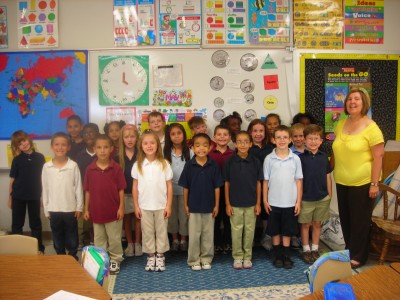
Ann Collet
Nominated By Ellen Peterson- Science is a state tested subject for 5th graders in Virginia and they cover so much material that hands-on activities and demonstrations fall by the wayside in most classrooms. Not Ann’s! She makes sure that every student (she teaches Science to 2 different classes) in her classes touches science by setting up lab experiences 1-2 times per week. What is so special about her is that she has convinced her students that Science is fun and exciting. She gives a monthly Science birthday party. Each child who has a birthday within the month gets to lead an experiment that reinforces concepts they’ve got to know for the test! Kids can chose the experiment or a treat and the kids ALWAYS choose the experiment. She posts the pictures on the wall outside of her classroom so everyone who passes by can see the work they’ve accomplished!
My first memory of taking a science class was when I was in junior high school, and I was terrified! Science must be hard, or we would have studied it in elementary school.
I could not have been more wrong.
As a teacher, my goal is to take the fear out of science. I simplify the content first, explain how the science happens, and then the students see or hear science in action by doing experiments or other hands-on activities.
We have a lot of giggles along the way!
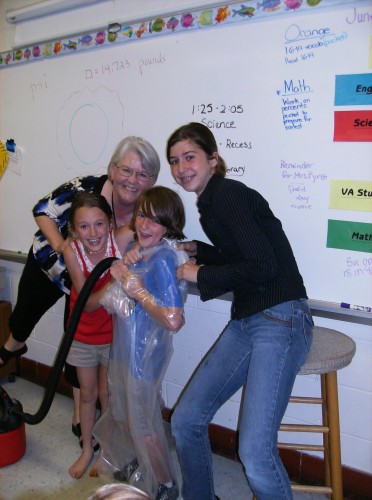
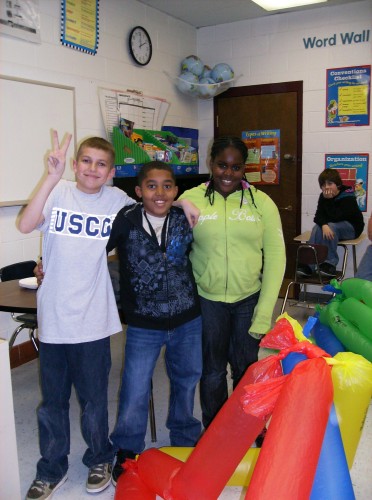
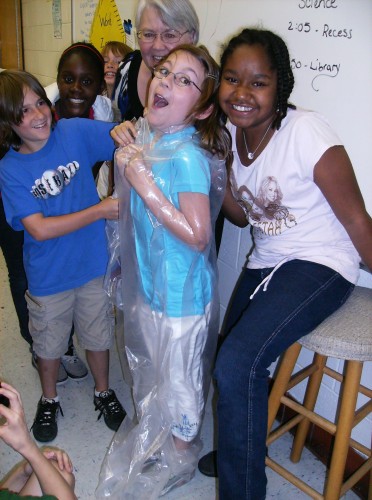
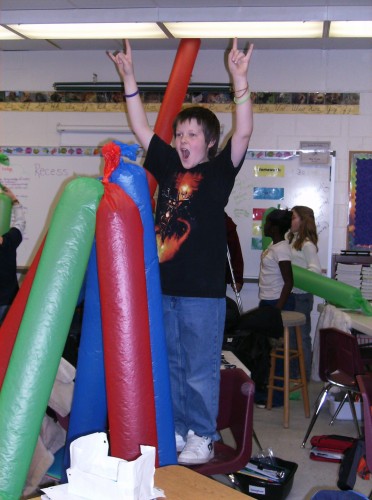
Bhava Rawal
Nominated by Steffany Ascencio – Ms. Rawal provides us innovative science projects. We learn science concepts through innovative labs and projects. Ms. Rawal is very dedicated to her work. She buys all the projects and lab materials for us and prepared everything before we come to class. Ms. Rawal’s science projects are always cool and very inspiring. We won thing place in science fair among all SBISD schools. Ms. Rawal also runs green club after school.
Ms. Rawal’s class project and green club involves building and using alternative energy resources in a model homes. Through this project we learned about and worked with the different types of energy resources. We also enhance this project by building a model city which incorporates alternate energy resources such as solar, wind, hydropower, biomass, geothermal, hydrogen into the city. In this project, students in each team study the types of alternative energy (i.e. solar, wind, geothermal, tidal and wave energy, hydroelectric, hydrogen, fuel cells, biomass and nuclear energy) to discover how the energy works and produces electricity. Each team analyze the alternative energy type for its advantages, disadvantages, locations for most effective use, percentage of the world that uses this energy and its use in Texas. Each team use the internet and other information resources to discover the latest discoveries and uses of the form of alternative energy that the team is studying. A total of at least twenty citations (e.g. web sites, periodicals, books or expert opinions) must be used. Students build house with bedroom with light, outlet and switch, kitchen with light, outlet and switch, bathroom with light, outlet and switch, living room with outlet, switch and ceiling fan, dining room with outlet, switch, and chandelier, Hallway with two switches and one light, the bedroom, kitchen, hall or bathroom has a second light so that the room has two lights in parallel. All lights in the house will be operated by alternative energy resources. Using these alternate energy sources could result in energy savings of approximately 15% in the model homes that we are building. We also determine the amount of energy used in each home then calculate percentages of energy savings by comparing the original model with alternate resources model.
An advertisement for a solar oven, solar panel, wind mill, hydrodynamic model, solar car, greenhouse, window shield, or foam insulation must be created to help market these alternate energy products to all students who pass by our classroom.
Each team prepares a PowerPoint presentation to use during the oral presentation.
Ms. Rawal teaches AP and Dual Credit chemistry classes. She took us to HCC, Sam Houston State University, NASA; Ms. Rawal worked under USDA grant and prepared us to receive scholarship towards Houston Community College. Thirteen of chemistry students received scholarship last year.
My science acumen has always been in the design, development and implementation of a wide variety of creative labs to make science fun and relevant. In my academic and professional life my students and I pursue and enjoy these activities. Numerous labs bring more fun to my science students who, in turn, utilize these concepts within their academic, technical and community lives.
I believe cool and fun labs, demonstrations, simulations, games, puzzles and dramatic explanations are tools to make students learn factual material more easily than just by memorization. It also stimulates their motivation to learn basic science concepts. Demonstrations and fun labs build creativity in the students:
- Labs like making ice cream helps students learn (viscerally!) that adding a solute to a solvent lowers the freezing point of that solvent.
- Take home crystallization lab improves students’ powers of observation as well as visualization of crystal structure.
- Preparing colorful solution to find different types of solutions
- Determine concentration of compounds in cola.
- Mentos in diet cola to make a fountain.
- Molecular model building to visualize 3D molecular structure.
- Measure calories in foods such as corn puffs.
- Determine percent sugar in gum.
- Determine percent water in popcorn.
- Calculate moles of carbon in pencil lead.
- Jeopardy games with formula questions can help children learn to build chemical formulas.
I strongly believe these activities increase students’ attention span, while connecting them to real life applications. By preparing the students for fun, safe and cool science labs practices, I can build good rapport with my students. I describe a method for teaching science via fun and exciting labs that is much easier, far faster, and more inclusive. This makes the transition from their actions to their understanding, leaving them able to use the science concepts correctly, easily, quickly.
My chemistry classes also involve a significant amount of teamwork. Several industries where students find employment emphasize the need for a “team player with good interpersonal skills”. For this purpose, I strongly advocate design innovative labs involving student groups, which provide students with vital opportunities to effectively work as a team. These labs are useful learning tools where the students assimilate and implement all the concepts they have learned in the classroom to bring the lab to fruition, write a report and make a final presentation.
On many occasions I have seen student groups allowed to work “independently” as a team without significant supervision. This defeats the basic purpose of initiating group work. The students need mentoring not only in the technical aspects of the labs but also in group interaction and effective teamwork. While the team work and interpersonal skills are acquired through experience, the instructor plays a crucial role in identifying their position within a dynamic group. An instructor should discuss various teamwork-related problems they might encounter and guide them through the process. I try to achieve this by spending significant time with each group. I also mentor individual students, keeping advice within the group.
Typically, science that I try to teach contains not only “strictly factual” elements but has a conceptual or logical component. Teaching by rote (e.g., telling students what the types of reactions are, or teaching them rules or recipes) makes it more difficult for students to understand or use concepts, so it takes them much longer to learn.
What is required for good teaching is to know how to find the connecting points between the subject matter and what kids know, or could more easily know. That means being able to know the sorts of things students tend to know in general and being able to ferret out which kids do not know that or what more things some kids might know already. And it also means knowing your subject matter so well that you can link it in some way to whatever you can find kids already know. And it means being able to figure out things you could easily teach them that would allow them to make the connection.
Teaching science is a demanding profession–your patience and creativity are constantly challenged and there is always something new to learn . . . and to teach! It’s a good bet that you seldom have enough time or resources to do everything you would like to do to help your students. Yet you consistently share your knowledge, passion and enthusiasm–helping students understand our world, preparing them for the future.
My philosophy as a teacher has always been to maintain the perception that the young minds sitting before me, or standing beside me during a laboratory exercise, are the future citizens of our world. I see my responsibility as a patient guide to my students so that they may grow towards the development of their own independence, as they become the leaders of their generation.
As a teacher of science I have always tried to instill in my own life as well as that of my students that science is an old, familiar, frequently used tool with which to enhance our lives, whether for safety, health issues, environmental issues, or just a clearer understanding of the nature of our shared physical world.
Scott Carswell
Nominated by Nancy Mooney – Scott’s love of science shows each day when he teaches the children. He is often more excited about the projects/experiments than the kids but his excitement wins the kids over every time.
The past two years we have participated in a science olympiad and Scott has dedicated a lot of time and energy into organizing teams, staying after school so the kids can work together and practice, encouraging them on when things get rough and most of all his love of the children. That love shines and that is truly what makes him such a wonderful science teacher.
Nominated by Lois Renfro – Mr. C. keeps the children very motivated and eager to learn. He maintains excellent communication with parents, as well. In the Science Olympiad 2008 at Univ. of Central Florida his 2 teams scored 1st & 2nd overall. Last week in the 2009 Science Olympiad his teams scored 1st & 3rd out of 38 teams!!! It has been an honor for my grandson to have Mr. Carswell for Homeroom and Science this year. He had devoted more time and energy than required and his students have blossomed through his efforts. He is an asset to Brookshire Elementary!
I’ve attached a few pictures from our recent Elementary Science Olympiad Competition. Our two teams placed first and third, overall, out of 41 teams. They had a great time. My educational philosophy on science is pretty simple.
- The learning has to be meaningful.
- The students need to be engaged.
- Science needs to be fun.
I’ve really gotten into the inquiry side of science lately. I love watching them explore, discuss and work through the many concepts that we cover. I like to work with students on their common misconceptions. It’s really fun to watch them work through these misconceptions and discover why their thinking was incorrect. I feel that it’s very important for the students to do the exploration to identify and correct their misconceptions about science.
Alicia Dean
Nominated by Deborah Riley – Ms. Dean is my son’s 2nd grade teacher and science is her all time favorite subject! Every week she has cool experiments for the kids such as making a working oven out of a shoebox – the kids are loving their hot dogs! This year while teaching the various stages of water, Ms. Dean had an accident with the boiling water. It spilled onto her foot and leg causing 2nd and 3rd degree burns. Safety is #1 for Ms.Dean so she made sure the children were far away during the experiment and kept a brave face the whole time. She lost about a month of work time as she recovered and still may end up with surgery. All the while Ms. Dean continued to develop engaging lesson plans and provide all the materials and detailed instructions needed so her subs could carry out the science teachings for her kids and keep them engaged! Now THAT is commitment and a true passion! I think she should be recognized for her love of science and teaching!
Science should taught as a hands on subject. Students need to be involved in their own learning. They need to experience life cycles of animals through watching the animals actually develop right here, right now, right in front of their own eyes! The students needs to play with liquids, solids and gases to understand the concept of matter. If we tell the kids that they are scientists, they will believe it. They CAN use words like hypothesize, conclusion, hand lens, pipette, polymer, even at a 2nd grade level. They can learn about the sun’s power by creating solar ovens and cooking with them. Children learn by doing. They do not learn just by reading out of a textbook. My kids get excited about science and want to learn more everyday. They love experiments and learn most of their critical thinking skills from hypothesizing and coming to conclusions. A teacher has to be in love with his or her subject in order to pass that passion on to the students. I love to let my kids experiment with polycrystals and see the look on my kid’s faces when they add water to them and see them expand. I love to use my computer microscope and print out the class’ fingerprints at 60x the size of the original. If you make science fun and hands on, the child will learn and will remember. If you let it come from a textbook and do rote worksheets, the students won’t enjoy science as much. I love it and have to share my enthusiasm with my class. An interactive project or hands on experiment is what children need to keep them interested and to progress. Setting high expectations for children is key in developing the scientific mind of any child. There is always an educational goal in mind in my class, but my children are having fun while learning.
Debbie Harris
Nominated by Margaret Newsom – Every time I see fellow teacher Debbie Harris’ 7th grade class, they seem to be on a mission of discovery. From solar experiments in the front courtyard, to the lego robotics club that she sponsors for middle school students, to the fact that she uses off periods to visit early childhood classrooms and get the students excited about science – just a few months ago I found her rediscovering gravity with a group of three year olds! Debbie has organized school wide science events, such as flight day from two years ago. She brought together a team of middle school students interested in helping to replant trees after Hurricane Ike had come through – her “Gale Force” team studied the effects from the hurricane, and did some replanting and replenishing of the environment. Year by year, Debbie inspires our students to investigate, and encourages other teachers to incorporate science in their daily lessons and lives. Debbie’s energy and passion for her subject inspire those around her.
“Over hundreds of years from today
It will not matter
What kind of car I drove
What kind of house I lived in
How much I had in the bank
Or what my clothes looked like
BUT, the world will be a better place
BECAUSE I was important in the life of a child!”
Author Unknown
This sums up my philosophy of education and being a teacher! I believe that education is about opening up the potential of all and helping them to become the problem-solvers of the future.
I also believe that teaching is a “calling” and I have been called to work with children along their pathway to their future. I want to expose them to lots of Science content, but I mainly want them relating these concepts to the real world through current events and problem-solving. Problems and competitions such as the environmental issues make education relevant to the students. These skills will make them leaders of our world.
This year Houston was hit hard by Hurricane Ike. I created a group called The Gale Force and we set about to replant many of the trees lost to the hurricane. In addition, using my stream table, students flooded New Orleans and then Galveston to demonstrate the effects of the storm surge. Of course, they flooded my room also.
During the astronomy unit, students created an Oprah-like show and had the sun, Earth, and other planets as guests. This was a lot more meaningful (a lot more fun than research papers). I want students making Science part of their life, not just memorizing facts!
Ellen Peterson
Nominated by Karen Barlow – Ellen uses hands-on labs so that science comes alive for our students. Students remember the objectives and results from her labs long after they leave her classroom. I will see students in town or in the mall, and they will say “hi” and then, “Remember when we shot off rockets”, or “Remember when we blew the giant bubbles that got stuck in your hair?” or “Remember when we wrapped you in toilet paper?” in Mrs. Peterson’s class?” They remember the lesson long after they leave us and even though I teach history, Mrs. Peterson gives me many ideas to make my lessons more meaningful – she shared the polyacrylamide spheres with me and my students used them in a lab demonstrating hemispheres of the globe!
Nominated by Byron Peterson – My wife has always been excited about science and making it real and tangible for her students. Right now, she’s teaching a unit on space. Being such an abstract concept for so many kids, she’s tried to find a touchable way to demonstrate each of the planets. It is a demonstration she calls “A Tour of The Planets”. For each planet, she has borrowed, created, or adapted a demonstration that is appropriate for a unique attribute of that planet. As the tour proceeds, she acts a tour guide, using photos and a telescope in class to view each photo. For Saturn, she recently learned that it’s density is less than that of water so using a diet soda/regular soda demonstration of sink or float, she tried to convey to her students that concept of Saturn’s density by showing them, instead of just telling them. Each planet is highlighted on the tour. Upon checking the answering machine at home today, a parent left her a message that said, “My child just demonstrated all nine planets to us!” She was so excited that they “took it home”! Science is alive in that home and in my wife’s classroom!
I am “that crazy science teacher” that is always setting something on fire or blowing something up. I am the one the kids point at as they see me in the hallway. “She sets things on fire on the first day of school!” “Someone told me she eats a candle in class!” “They do the coolest stuff in that classroom.” But more importantly, “I told my parents about that thing we did in class.” “I taught my brother how inertia works!” “I don’t know what you do in your classroom, but my daughter just won’t stop talking about it.” As the students go by my door, they always peek. They can’t help it. That’s exactly how I want it.
If I can’t make it real, they probably won’t get it. That sums up my philosophy of teaching in one sentence or less. I teach 6thgrade science in Virigina. Like most states, we test A LOT here. Science is the one subject that is not tested in 6th grade and I often feel pressured to let science slide in favor of TESTED material. The material I cover won’t appear on THE TEST until 8thgrade. On the first day my students enter my classroom, THE TEST is almost 3 years away but it covers material I teach. If I can’t make it real, make it big (read: make it explode), there’s no way they will recall it when they need it. When you couple that with the “push down” curriculum of developmentally inappropriate concepts that my children are expected to underst and it i s such a difficult task to reach my audience. I HAVE to entertain; I HAVE to invoke their curiosity; I HAVE to recall that sense of wonder that has been TESTED out of them. Because of that we rarely spend more than 1 day in a row in lecture or notes. I demonstrate or they explore in a lab experience every concept for which I can manufacture an event. I want them to ask questions, make connections, and figure out why. Ultimately, according to the state, my job is prepar ing them for the test. To me, my job is preparing them to encounter life. Life doesn’t come at you on a piece of paper with multiple-choice answers.
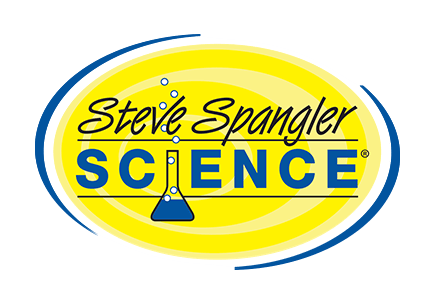


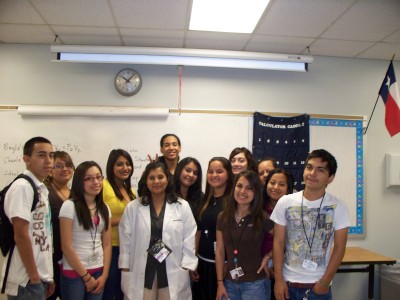
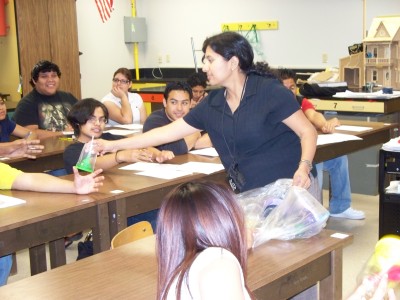
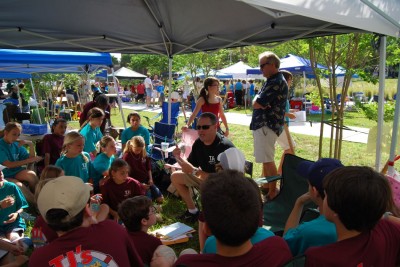
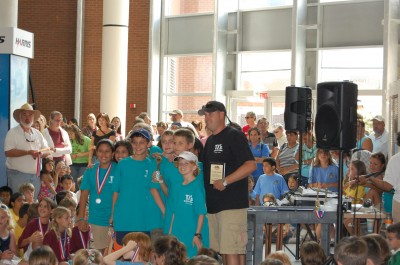
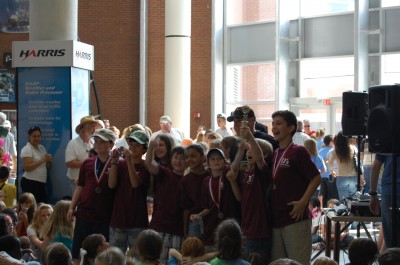
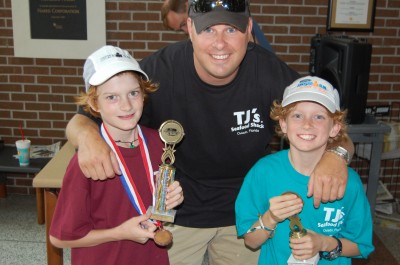
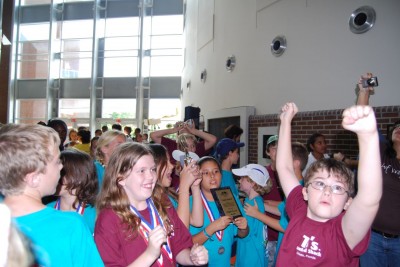
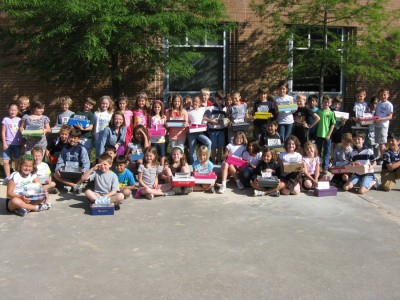
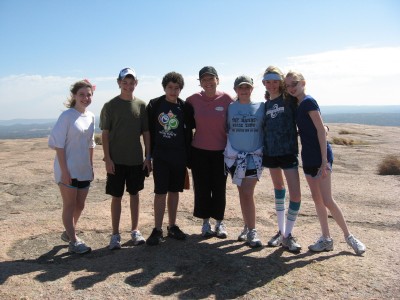
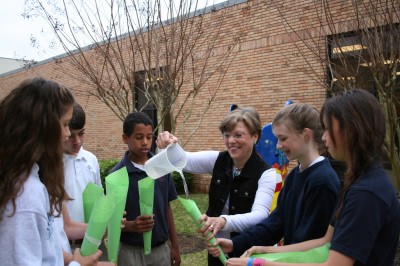
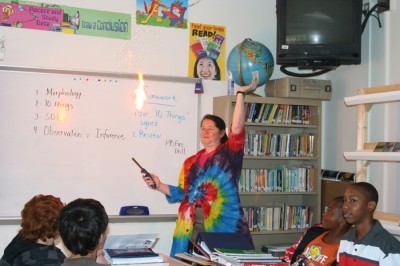
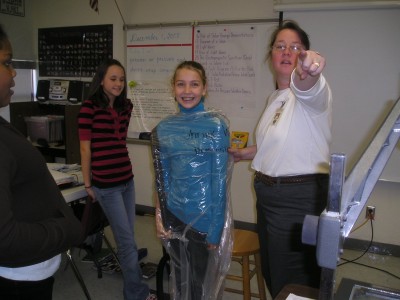
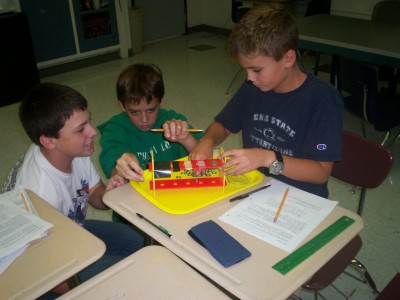
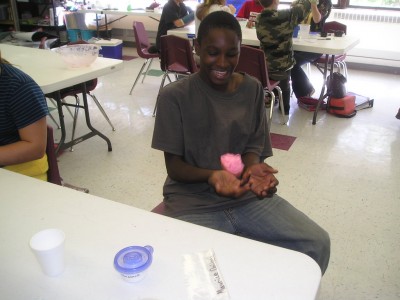
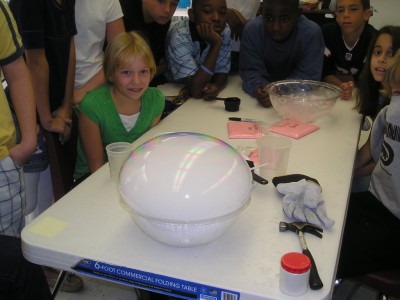

WOW! Such amazing teachers! Thanks, Steve, for taking the time to spotlight these outstanding Science teachers!
Are these experiments to young for 7th graders?
I teach 7th grade Life science